In most cases, the answer is no. The fungi, bacteria, viruses, and nematodes that cause disease in plants are very different from those that cause disease in humans and other animals. Eating or touching an infected plant would not infect us with the same pathogen that is making the plant sick.
However, produce from sick plants often has a flavor or texture very different from healthy produce, so eating it may not be desirable anyway. Unless the disease is merely a superficial spot (such as sooty blotch and flyspeck on an apple), it may be best to avoid diseased produce.
There are very few pathogens that can infect humans as well as plants, and those that do tend to be "opportunistic pathogens" of both, only able to infect weakened hosts. Perhaps the most notable of these pathogens is the bacterium Pseudomonas aeruginosa, which can cause a weak soft rot of plants such as lettuce. In people with compromised immune systems, this bacterium is known to infect the urinary tract, lungs, blood, and burns and other wounds. It is especially common in hospitalized patients whose immune systems are compromised by severe burns, cancer, AIDS, or cystic fibrosis. For most of us (and for most healthy plants), P. aeruginosa is not a concern.




